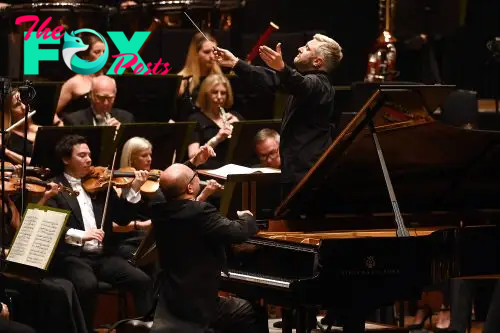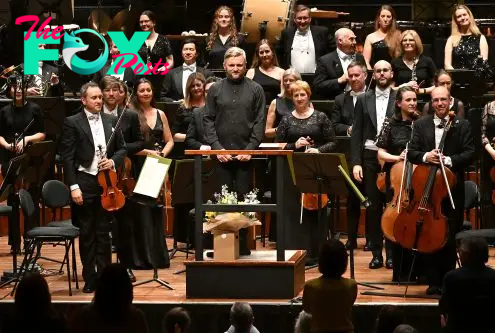Entertainment
Kirill Karabits’s becoming farewell with the BSO – Seen and Heard Worldwide
 United Kingdom Bartok, Prokofiev, Shostakovich: Alexander Gavrylyuk (piano), Bournemouth Symphony Orchestra / Kirill Karabits (conductor). Lighthouse, Poole, 15.5.2024. (CK)
United Kingdom Bartok, Prokofiev, Shostakovich: Alexander Gavrylyuk (piano), Bournemouth Symphony Orchestra / Kirill Karabits (conductor). Lighthouse, Poole, 15.5.2024. (CK)

Bartók – Suite, The Miraculous Mandarin
Prokofiev – Piano Concerto No.3
Shostakovich – Symphony No.5
There was sturdy emotion within the air because the viewers stuffed – sure, stuffed – the house of the Bournemouth Symphony Orchestra for this live performance: this was to be Kirill Karabits’s final look there because the orchestra’s Chief Conductor. The love and esteem wherein he’s held was instantly obvious within the spontaneous and extended standing ovation that greeted his look. He and the orchestra will seem collectively in a BBC Promenade at Bristol Beacon in August: and on Sunday, 19 Might, they are going to carry out three Voices from the East concert events in a single day at London’s Royal Pageant Corridor, at 1pm, 4pm and seven.30pm. Do take this never-to-be-repeated alternative to listen to the music of Japanese European composers in case you presumably can!
This was a celebratory live performance, however there was nothing snug in Karabits’s chosen programme: three masterpieces from the primary half of the 20th century. Bartók’s Suite from his stage work The Miraculous Mandarin is music with a harsh, brutal edge: the closest he obtained to atonality. He referred to as it a Pantomime in One Act, however you solely should learn the synopsis to grasp it’s undoubtedly not for kids: the Mandarin’s destiny is probably a lurid (and sordid) distortion of the concept of the Love-Dying in Wagner’s Tristan und Isolde.
The music is straight away unsettling, trombones and tuba (on positive type) baying within the city jungle. Anxious leaps for the clarinet; sinister rumbling within the cellos; distinctive contributions from all of the woodwind principals; a genuinely creepy entry for the Mandarin, with skirling woodwind, muted trombones and a slithering tuba. The orchestra projected Bartók’s unsettling fragments and transient bursts of lyricism brilliantly: Karabits carried out beautifully, permitting each element to inform, and bringing the music to a pitch of tautly managed pleasure on the finish. He fairly rightly obtained the three clarinets to their ft for a bow: he might need achieved the identical, I assumed, for the three trombones.
There was an extra torrent of instrumental and orchestral brilliance within the live performance’s centrepiece, Prokofiev’s Piano Concerto No.3. Alexander Gavrylyuk, Ukrainian with Australian citizenship, appeared to me extra like a kindly financial institution supervisor than the Components One pianist that this work requires: however he quickly dispelled that impression, taking part in with percussive brilliance and hovering lyricism, overcoming all challenges with gleeful vitality. There was real fantasy in his taking part in towards pizzicato strings within the first motion, and within the gradual motion’s impressionistic passage towards rising horn fifths and octaves and a ghostly tracery within the violins. Karabits and the orchestra have been with him all the way in which, and the concerto came visiting not a lot as an train in diabolical virtuosity as an outpouring of irrepressible good humour. Bravo!
After the interval, Shostakovich’s Fifth Symphony. One instantly seen Karabits’s consideration to string dynamics: there was a lean, centered readability to the string taking part in that set the tone for the entire symphony. It was thrilling to listen to the way in which Shostakovich ratchets the stress in the direction of the primary motion’s stark climax: however what I keep in mind most vividly is the attractive taking part in of flute and horn in its aftermath, the ghostly thread of sound from the solo violin, and the celeste’s ultimate drops of ice.
After the Allegretto – characterfully dispatched, with roistering horns – it was the strings once more that impressed within the Largo, taking part in with Mahlerian eloquence and making it abundantly clear that that is the guts of the symphony. There was a noble restraint of their taking part in, whether or not in passionate outcry or in pianissimo grief. Stunning touches, too, from harp and flutes, a desolate oboe, clarinets, bassoons. Karabits and the orchestra achieved what some performances fail to: the place in a lesser efficiency we could be ready impatiently for the finale’s fireworks, they took us on a journey inwards to a spot – a tundra of the creativeness and the feelings – from which the finale rudely remembers us, however which it isn’t in a position fully to dispel. That mentioned, the finale was certainly thrilling, not least within the strings: they actually seethed. Once more, Karabits paced the method to the fairly coarse peroration completely. It will not be convincing, however it’s actually stirring.

Karabits forbore to make a prolonged speech: he mentioned, touchingly, that for what he wished to say, phrases are by no means sufficient. As a substitute, he carried out the strings in a shifting piece by his fellow-Ukrainian Valentin Silvestrov, fittingly entitled Farewell Serenade. He described it as joyful/unhappy, leaning to the previous: and so it proved, with the violins coming in in the direction of the tip with a theme within the main, and an surprising harmonic shift bringing a radiant shut.
At first of the live performance there had been a tribute to viola participant Jacoba Gale, retiring from the orchestra after greater than 44 years – a file. Earlier than he left the stage on the finish, Karabits took a yellow rose from the bouquet he had been offered with and gave it to her.
Chris Kettle
-

 Entertainment25m ago
Entertainment25m agoA Look at the Dating History and Rumoured Relationships of BIGBANG Star G-Dragon
-

 Entertainment7h ago
Entertainment7h agoMike and Lauren Sorrentino Introduce Baby No. 3 to Kids in ‘Jersey Shore’ Exclusive Clip
-

 Entertainment11h ago
Entertainment11h agoNatasha Rothwell on Her Memorable Firsts
-

 Entertainment16h ago
Entertainment16h agoFace Me and Other Korean Medical Crime Shows That are Must Watch
-

 Entertainment22h ago
Entertainment22h agoClassic Korean Movies Like Piagol to Add to Your Watch List
-

 Entertainment22h ago
Entertainment22h agoOver 60 Million People Tuned in to Watch Jake Paul vs. Mike Tyson
-

 Entertainment1d ago
Entertainment1d agoPopular Hudson Valley Italian Restaurant Addresses Closing Rumors
-

 Entertainment1d ago
Entertainment1d agoRHOBH’s Dorit Kemsley Addresses Viral Smoking Scene on Season 14 Premiere: ‘I Was Being Chased’



















